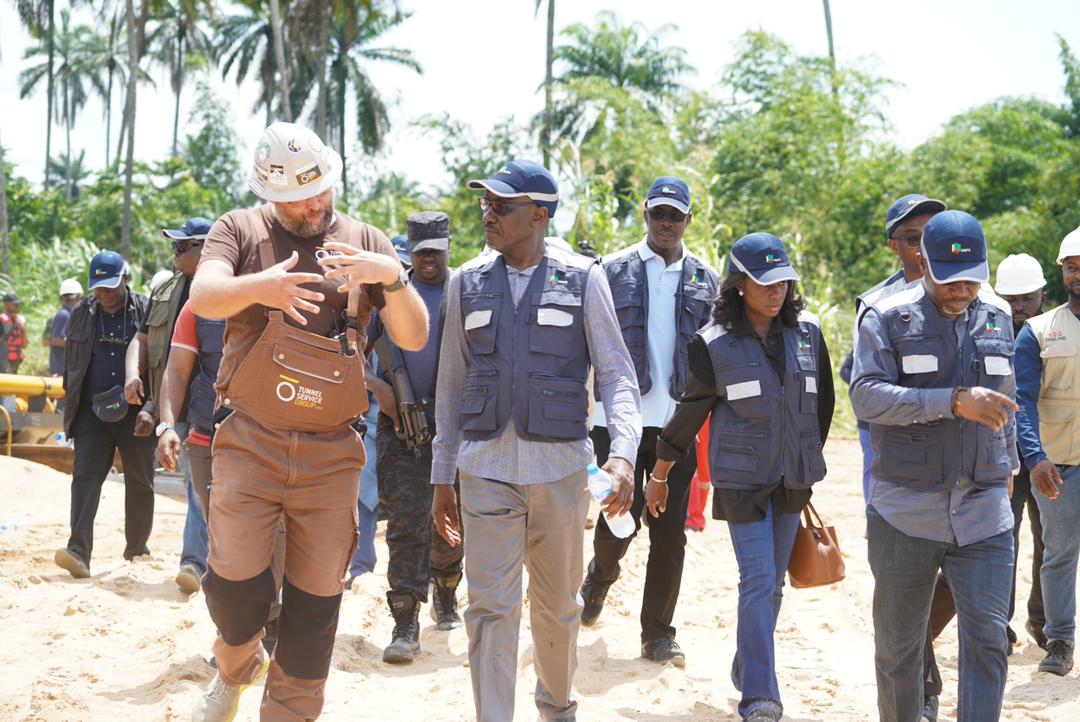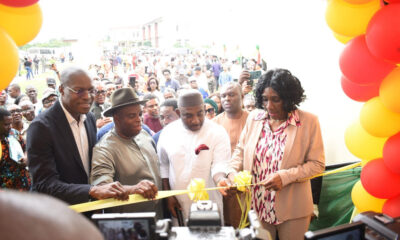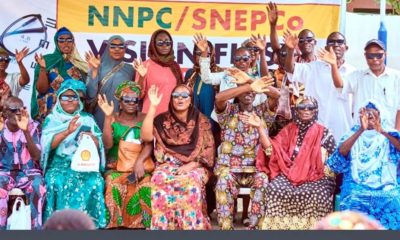Energy
NNPC Ltd Eyes Gas Revolution With OB3 Gas Pipeline Project

. . . FG Delighted With Project’s Progress
In yet another major step towards boosting nationwide gas supply to drive industrialization and economic growth, the Nigerian National Petroleum Company Limited (NNPC Ltd) is set to deliver the Obiafu-Obrikom-Oben (OB3) Gas Pipeline project.
Group Chief Executive Officer of NNPC Ltd, Mele Kyari, confirmed this during an inspection tour of the OB3 pipeline River Niger Crossing operation at Aboh, Delta State, on Saturday.
Biztellers reports that by design, the OB3 Gas pipeline is the inter-connector which links the Eastern gas pipeline network to the Escravos-Lagos Pipeline System (ELPS) in the West and the Ajaokuta-Kaduna-Kano (AKK) Pipeline in the North.
The River Niger Crossing operation has been the major impediment to the completion of the strategic OB3 Gas Pipeline for over three years due to failure of the various technologies deployed to achieve the construction of the 48-inch pipe under the river bed between Ndoni in Rivers State and Aboh in Delta State.
But with the adoption of the Micro-Tunnelling/Direct Pipe Installation technology, the new contractors, Messrs HDD Thailand/Enikkom and Tunnelling Services Group (TSG), are making a headway with about 860meters out of the 1,800meters achieved so far.
After the inspection tour, Kyari expressed delight at the breakthrough, which signals the imminent completion of the project.
“This is a major project of monumental value to our country. What this means is that this is the only way we can deliver the gas revolution. I am very happy and convinced that, latest by the middle of August, we will complete this project. I have been assured of that by the project team”, Kyari stated.
On the significance of the project, he said, “Once completed, we will see about 2.2billion standard cubic feet of gas coming into our network. We believe that this will give our country a breathing space of demand, I am sure we can catch up with that kind of demand in the next one and half years. We are happy that this will give us the platform to unleash the gas revolution in our country”.
Also speaking on the project, the Minister of State for Petroleum Resources (Gas) Rt. Hon. Ekperikpe Ekpo, expressed satisfaction with the pace of work at the OB3 River Niger Crossing operation, describing it as “Renewed Hope at work”.
“I was here last year and I saw the work that was going on. There was a promise that it would be completed by December last year. I took it with a doubt. But today, from what I can see, I am confident that by July or August it will be completed and it will be commissioned by the President”, the Minister stated.
On her part, the Special Adviser to the President on Energy, Olu Verheijen, said she was looking forward to the completion of the project having been assured by the technical team that the right technology has been found to resolve the complex challenges of the River Niger Crossing.
“As the Minister and other speakers have said, we are looking forward to having this project deliver prosperity to Nigerians in the form of electricity and other areas”, Verheijen said.
The Managing Director of Tunnel Service Group (TSG), one of the contractors to the project, Mr. Ingo Justen, who is personally on ground to supervise the project on the request of the GCEO, expressed confidence that the current technology being applied in the execution of the project would lead to its speedy conclusion.
In a presentation earlier, the Managing Director of NNPC Gas Infrastructure Company (NGIC), Engr. Seyi Omotowa, disclosed that at the rate of progress with the new technology deployed, the River Niger Crossing operation, which is the only aspect of the OB3 Gas Pipeline Project left, will be achieved on schedule.
Energy
Nigeria’s Gas Output Increases By 2.9%, Reaching 2.29 MSCF

Amid a slight increase in gas production, Nigeria’s oil output experienced a substantial rise in November 2024.
Gas production saw a 2.9% month-on-month (MoM) increase, reaching 2,292,951 million standard cubic feet (MSCF) from 2,292,471 MSCF in October.
However, on a year-on-year (YoY) basis, the growth was minimal, with a mere 0.02% increase in output for the first 11 months of 2024, compared to the same period in 2023.
READ MORE: Tinubu Mourns Ex-U.S. President Jimmy Carter, Celebrates His Legacy
The latest gas report from the Nigerian Upstream Petroleum Regulatory Commission (NUPRC) also revealed a 1.6% increase in domestic gas consumption.
A total of 606,658 MSCF was consumed locally, compared to 596,861 MSCF during the same period in 2023. Gas exports, meanwhile, rose by 6.9%, reaching 829,156 MSCF, up from 775,547 MSCF in the corresponding period of 2023.
This growth in exports continues to play a vital role in bolstering Nigeria’s foreign exchange earnings.
Despite these positive figures, sources close to the Ministry of Petroleum Resources (Gas) noted that oil remains the dominant force in Nigeria’s energy sector, with gas taking a secondary role.
On the other hand, the NUPRC’s oil production report revealed a remarkable surge.
Nigeria’s oil output, including condensates, rose by 13.3% year-on-year in November 2024, reaching 1.7 million barrels per day (bpd), up from 1.5 million bpd in November 2023. Month-on-month, oil production also increased by 10%, from 1.5 million bpd in October 2024.
Dr. Muda Yusuf, CEO of the Centre for the Promotion of Private Enterprises (CPPE), discussed the broader structural dynamics within Nigeria’s economy, highlighting the dominance of the non-oil sector.
In his 2025 Outlook, Dr. Yusuf noted that the non-oil sector contributed 94.43% to Nigeria’s GDP in Q3 2024, while the oil sector accounted for just 5.57%.
“However, the economy is characterized by a paradox of the oil sector contributing an estimated 90% of foreign exchange earnings, while the non-oil sector accounts for about 10%,” Dr. Yusuf said.
“This is a structural shortcoming in our economy which needs to be addressed, as sectors that contribute hugely to GDP have no corresponding contribution to foreign exchange earnings.”
He further emphasized the need to address the challenges faced by the non-oil sector, which include issues related to productivity, infrastructure, funding, and regulatory constraints.
“The policy implication is that more should be done to fix the challenges of productivity and competitiveness of the non-oil sector of the economy,” Dr. Yusuf added
Energy
JUST IN: NNPC Ltd Reopens Warri Refinery

The Nigerian National Petroleum Company Limited (NNPC Ltd) has announced that the 125,000-barrel-per-day Warri Refining & Petrochemicals Company (WRPC) in Warri, Delta State, has become operational.
This is coming about a month after the commencement of operations at the 60,000-barrel-per-day-old Port Harcourt Refinery.
The Group Chief Executive Officer, NNPC Ltd, Mele Kyari, made the disclosure during a tour of the facility on Monday.
ALSO READ: SERAP Urges Tinubu To Direct CCB To Publish President’s, VP’s, Others Assets
A video posted by Channels TV on Monday showed Kyari addressing a tour team, which included the Chief Executive Officer of the Nigerian Midstream and Downstream Petroleum Regulatory Authority (NMDPRA), Farouk Ahmed.
Before the tour commenced, Kyari explained that the inspection aimed to show Nigerians the level of work completed so far.
According to him, although the repairs on the facility are not yet 100 per cent complete, operations have commenced.
He said, “We are taking you through our plant. This plant is running. Although it is not 100 per cent complete, we are still in the process. Many people think these things are not real. They think real things are not possible in this country. We want you to see that this is real.”
Located in Ekpan, Uwvie, and Ubeji, Warri, the petrochemical plant produces 13,000 metric tonnes per annum (MTA) of polypropylene and 18,000 MTA of carbon black.
Commissioned in 1978 and managed by NNPC Ltd, the WRPC was built to supply markets in the southern and southwestern regions of Nigeria.
The mechanical completion of the facility was initially scheduled for the first quarter of 2024, according to the Spokesperson of the NNPC Ltd, Olufemi Soneye.
“Warri should be done by Q1 (first quarter) 2024,” Soneye stated.
The WRPC is one of Nigeria’s four refineries. Others include the old and new Port Harcourt Refining Company in Rivers State and the Kaduna Refining and Petrochemical Company in Kaduna State.
Energy
Dangote Partnership: MRS Urges Nigerians To Insist On N935/Litre Petrol Price Nationwide

MRS Oil Nigeria Plc, a prominent player in the Nigerian downstream oil industry, has implemented a new petrol price of N935 per litre across all its retail service stations nationwide.
The company has also called on Nigerians to monitor and report any outlets that fail to adhere to the new price structure.
Biztellers reports that this is consequent upon an announcement by the President of Dangote Industries Limited, Aliko Dangote, that the Dangote Petroleum Refinery has partnered with MRS Oil and Gas to offer petrol at N935 per litre at retail outlets, following a reduction in the ex-depot price from N970 to N899.50 per litre.
ALSO READ: Dangote Slashes PMS Price To N899.50k
It was gathered that MRS Oil Nigeria Plc has instructed all its outlets to implement the new price immediately, setting up a digital platform and monitoring team to ensure full compliance.
In a statement on Monday night, the company declared, “Petrol is now being sold at N935 at MRS Filling Stations nationwide. If you find any station not following this price, please report it. Call 08009447853 or email: NG-FMKPMGWHISTLEBLOWING@NG.KPMG.COM”
Emphasising the eco-friendly nature of its products, MRS Oil added, “We call on all petrol station owners to join MRS Oil Nigeria Plc in improving the supply chain of our beloved country, ensuring product quality and availability in every corner of Nigeria for the benefit of all Nigerians.”
In Lagos, commuters were seen queuing at MRS filling stations to purchase petrol, with many expressing their gratitude to the Dangote Petroleum Refinery and MRS Oil and Gas, urging other marketers to support the indigenous refinery rather than import off-spec products into the country.
A commuter at the MRS station at Alapere on the Lagos Ibadan Express way, Ibukun Phillips, could not hide her joy as her husband filled up their car.
“I am very happy today. This is a victory for Nigeria,” she said. “The price reduction is the best gift of the season. But beyond just the reduction, we are buying standard, eco-friendly petrol at a lower rate. My husband and I have decided we will only be using MRS from now on because we are confident in the quality of the product and supporting the economy.”
A commercial bus driver, Adio Ajibade described the price reduction as a great relief, especially during the festive season.
“The reduction is a great relief. It will reduce transportation costs and benefit Nigerians. God will continue to bless Alhaji Aliko Dangote,” he said.
A public affairs analyst and university lecturer, Dr. Tunde Akanni, said the collaboration between Dangote Petroleum Refinery and MRS Oil represents a significant step towards improving the affordability, quality, and sustainability of petroleum products in Nigeria.
According to Dr. Akanni, “this move will not only help ease the financial burden on Nigerians but also promote a more environmentally conscious approach to fuel consumption, benefitting both the economy and public health in the long term.”






















